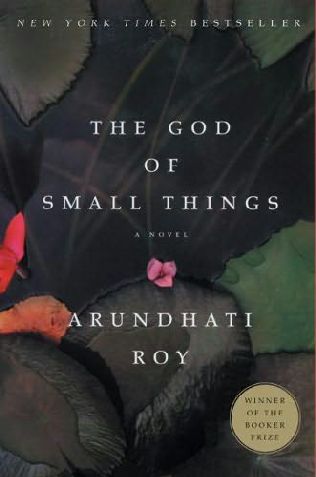 This is quite an extraordinary piece of literature. I say 'literature' because this is not just a novel or a book. Almost anyone can write a book; literature is much more elusive.
This is quite an extraordinary piece of literature. I say 'literature' because this is not just a novel or a book. Almost anyone can write a book; literature is much more elusive.I came across Arundhati Roy in an interview with Andrew Denton in 2004. I was impressed with her activism, her integrity, her grace, and her way with words (not necessarily in that order), so I bought and read The Checkbook and the Cruise Missile, a collection of anti-globalisation essays she had written.
The God of Small Things is her first and only novel, and it won her the Booker in 1997. It is partly autobiographical, with the character of Rahel apparently being based on her (though Roy is not a twin), and many of the scenes and places in the book reflecting those of her own childhood. Writing it took five years of her life, during which she barely spoke to anyone about it, emerging at the other end with no idea whether it was even intelligible to anyone but her.
It has an aesthetic unlike any other book I've read, and not only in terms of the words it uses, or even the way it uses them. It tells the story not in linear fashion, but unravelled gently like a frail old woman with a ball of wool. Or rather, ravelled. Constructed, carefully, but not primarily in a functional way; instead it grows and fills out in beautiful sections or layers, like a jigsaw puzzle made of words. To say she has a way with words would be an understatement. She uses them in such a way that you are left with the smell or taste or vision lingering on your senses, even though in a literal sense she has barely described the thing at all. Here's a sample (which contains a number of self-references, but gives an idea of the prose):
In her stiff lace dress and her fountain in a Love-in-Tokyo, Rahel looked like an Airport Fairy with appalling taste. She was hemmed in by humid hips (as she would be once again, at a funeral in a yellow church) and grim eagerness. She had her grandfather's moth on her heart. She turned away from the screaming steel bird in the skyblue sky that had her cousin in it, and what she saw was this: red-mouthed roos with ruby smiles moved cemently across the airport floor.Hemmed in by humid hips. Moved cemently across the airport floor. Brilliant.
Heel and toe
Heel and toe
Long flatfeet. Airport garbage in their baby bins.
I'm only halfway through the book, so I have no idea how it turns out, but this is one example of how you can enjoy the journey as much as the destination. Seriously: run, don't walk, to read this book.
No comments:
Post a Comment